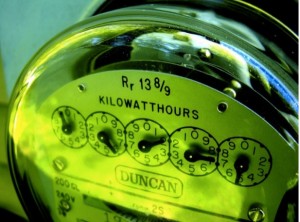The term is almost self-explanatory. Being efficient means being productive without wasting time or materials or energy. Doing more with less.
It’s a way of managing energy demand and it has been said that demand for energy can be satisfied with coal, gas, oil, uranium or efficiency. The first three create problems for greenhouse gases, uranium create great risks, while efficiency leads to lower fuel bills and less spending on energy infrastructure. See, Economist below.
In terms of usage of power to drive cars, heat homes, generate electricity, it means to use less energy to produce the same service. For example, if you replace an incandescent lamp with a compact fluorescent lamp, you produce the same amount of light but use less energy because of the technology of the lamps. When you install insulation in the walls of your house, the insulation keeps the warm or cool air inside and you use less energy in your heater or air conditioners, and save money. Repairing water pipes and electric ducts, to prevent leakage, uses the same infrastructure more efficiently. Fuel efficient cars save gas. With many energy efficiency improvements, there can be a rebound effect as when cheaper fuel costs encourages people to drive more.
In contrast, energy conservation is a way to reduce the demand to save energy, as when you turn off lamps when you leave the room.
Governments can be helpful in promoting energy efficiency by requiring new appliances and equipment (e.g., cars) to be built with new technology to reduce energy (e.g., gas) consumed, and by developing building codes that require insulation and other energy saving practices.
Some further ideas to explore on Energy Efficiency:
Determine if any appliances or equipment in your school or place of work can be replaced with more efficient models.
Of the appliances or equipment you identified, pick one and determine how much more expensive the newer, more energy-efficient model will cost and how much you would save in energy costs by using a new more efficient model.
Sources:
European Commission, Energy Efficiency ec.europa.eu/energy/efficiency/index_en.htm
“Energy efficiency: The elusive negawatt,” The Economist (8 May 2008). www.economist.com/node/11326549
“What is energy efficiency?” Lawrence Berkeley National Laboratory eetd.lbl.gov/ee/ee-1.html
“Energy Efficiency” International Energy Agency www.iea.org/topics/energyefficiency/
Alliance to Save Energy, Energy Efficiency: A Tool for Climate Change Adaptation, an Alliance White Paper www.ase.org/resources/energy-efficiency-tool-climate-change-adaptation-alliance-white-paper
Yale School of Forestry & Environmental Studies, Energy Efficiency Key to Fighting Climate Change environment.yale.edu/news/article/energy-efficiency-key-to-fighting-climate-change/



No comments yet, add your own below